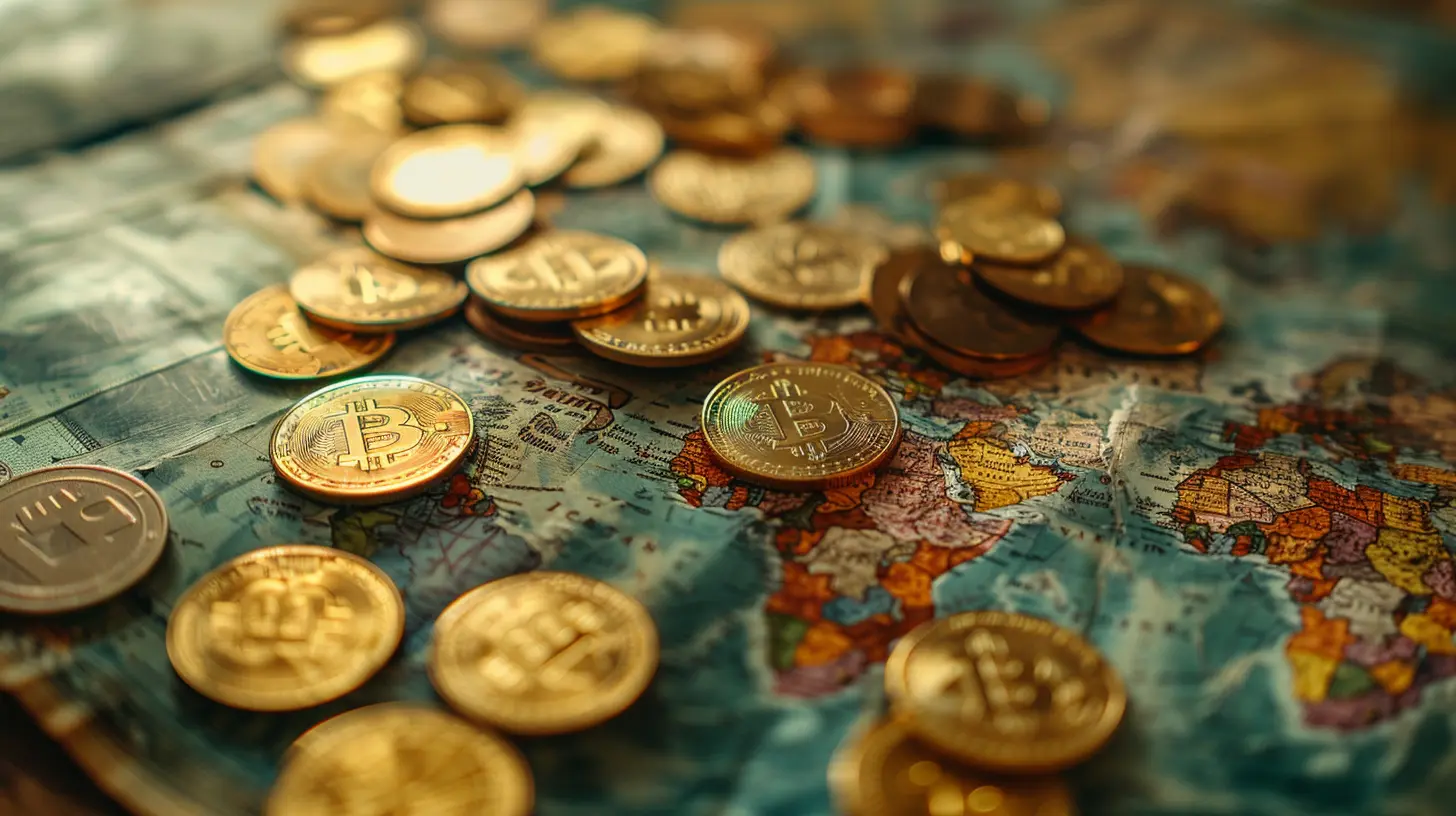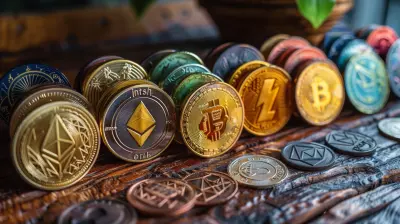What Role Does Cryptocurrency Play in Geopolitics?
12 April 2025
Cryptocurrency isn’t just about trading Bitcoin or chasing the latest altcoin trend. Beneath the surface, it's shaking up the global balance of power, influencing economies, and even redefining how nations interact. But how exactly does crypto fit into the geopolitical landscape? Well, buckle up—because this digital revolution is more than just a financial fad. It's a game-changer.
The Power Shift: How Crypto Challenges Traditional Financial Systems
For decades, financial powerhouses like the U.S. and European nations have dominated global markets, wielding influence through central banks, economic sanctions, and international financial institutions. However, cryptocurrencies introduce a decentralized alternative—one that bypasses these traditional financial structures.With Bitcoin, Ethereum, and various digital currencies, transactions don’t rely on banks or governments. Instead, they operate on decentralized blockchain networks. This shift challenges the traditional financial order, offering individuals and even nations an escape hatch from economic dependence on Western financial systems.
So, why does this matter geopolitically? Because money equals power, and cryptocurrencies are redistributing both.
Cryptocurrency as a Tool for Sanctioned Nations
Economic sanctions have long been a political weapon used by dominant economies. Countries like the U.S. impose sanctions to restrict access to financial systems, limiting an adversary's ability to trade, invest, or even access global banking networks like SWIFT.But crypto changes the rules.
Dodging Sanctions with Digital Assets
Nations under heavy sanctions—such as North Korea, Russia, and Iran—have turned to cryptocurrencies to bypass traditional financial restrictions. Since crypto transactions occur on decentralized networks, they can avoid traditional banking oversight, making it harder for sanction-imposing countries to track and control financial movements.For example, Iran has reportedly used Bitcoin mining to generate revenue while circumventing restrictions on banking transactions. Similarly, North Korea has been linked to crypto-based cyber heists, allegedly funding its weapons programs through stolen digital assets. This presents a massive challenge for policymakers trying to enforce financial restrictions in an increasingly digital world.
The Dollar vs. Digital Currencies: A Threat to U.S. Dominance?
The U.S. dollar has long been the backbone of global trade. Countries trade oil in dollars, settle debts in dollars, and hold reserves in dollars. But what happens when nations start preferring Bitcoin, stablecoins, or even central bank digital currencies (CBDCs) over the traditional greenback?The Rise of CBDCs and the Digital Yuan
China, for instance, has been aggressively pushing its digital yuan. This state-controlled cryptocurrency aims to reduce reliance on the U.S. dollar in international trade while giving China more control over financial transactions. If widely adopted, it could weaken the dollar’s dominance and shift economic power toward Beijing.Similarly, countries like Russia and India are exploring their own digital currencies to reduce dependence on Western banking systems. If more nations embrace CBDCs or decentralized cryptocurrencies, the influence of the U.S. financial system could wane, altering the global power dynamic.
Cryptocurrencies in Global Conflicts
Cryptocurrency isn’t just an economic weapon—it plays a major role in modern conflicts, too.Funding Rebel Groups and Warfare
Crypto offers a way to move money quickly and anonymously, making it a preferred method of fundraising for various groups. For instance, during the Russia-Ukraine war, Ukraine received millions in cryptocurrency donations to support its defense efforts. Crypto allowed for fast, borderless transactions without relying on banks.On the flip side, terrorist organizations and rogue groups have also used cryptocurrencies to fund illicit activities. Without regulated financial oversight, tracking these transactions becomes a cat-and-mouse game between authorities and bad actors.
Can Governments Control Crypto? The Regulatory Battle
With crypto disrupting traditional financial frameworks, governments worldwide are scrambling to regulate it. But here’s the catch: decentralization makes control nearly impossible.Banning vs. Regulating
Some countries, like China, have gone the hardline route—banning crypto outright to maintain control over financial transactions. However, banning doesn’t necessarily work, as people find ways around restrictions through decentralized exchanges or offshore trading platforms.Other nations, like the U.S. and the European Union, are taking the regulatory approach. They aim to integrate crypto into the existing financial system while implementing laws to prevent money laundering, tax evasion, and fraud.
The big question remains: Can regulators truly control something designed to be uncontrollable? The battle between decentralized finance (DeFi) and government-imposed regulations is far from over.
The Future: Will Crypto Redefine Global Power Structures?
As cryptocurrencies continue evolving, their impact on geopolitics will only grow. Whether it’s countries using digital assets to evade sanctions, rebels funding wars with Bitcoin, or nations developing state-backed digital currencies to challenge the dollar—crypto is more than just an investment. It’s a cornerstone of political power in the digital age.While governments struggle to regulate it, and financial giants seek control, one thing is certain—crypto isn’t going anywhere. The real question is: will it be a force for financial freedom or a tool for geopolitical chaos?
all images in this post were generated using AI tools
Category:
CryptocurrencyAuthor:

Audrey Bellamy
Discussion
rate this article
6 comments
Danica Larsen
Cryptocurrency: the new digital diplomat! Who knew Bitcoin could negotiate better than some world leaders? Let the fun begin!
May 11, 2025 at 8:15 PM

Audrey Bellamy
Thank you for your comment! Cryptocurrency indeed offers a unique avenue for diplomacy, enabling new forms of negotiation and collaboration in the geopolitical landscape. It's an exciting development to watch!
Wade McWhorter
Cryptocurrency is reshaping geopolitical landscapes by challenging traditional financial systems and enabling decentralized transactions. Its rise empowers nations and individuals, influencing policy decisions and creating new economic alliances in our increasingly interconnected world.
April 23, 2025 at 8:22 PM

Audrey Bellamy
Thank you for your insightful comment! I completely agree that cryptocurrency is a transformative force in geopolitics, reshaping power dynamics and fostering new economic relationships.
Dash McVey
What a fascinating exploration of cryptocurrency’s impact on geopolitics! It's exciting to see how digital currencies are shaping global dynamics and influencing power structures. The future is bright as we witness technology and finance intertwining in such meaningful ways. Keep up the great work!
April 20, 2025 at 7:33 PM

Audrey Bellamy
Thank you for your thoughtful comment! I'm glad you found the exploration of cryptocurrency's geopolitical impact intriguing. It's a dynamic field with so much potential for change!
Tate O'Neal
Cryptocurrency transcends mere economics, becoming a tool for sovereignty and power in geopolitics. As nations navigate control and influence, digital currencies challenge traditional financial systems, prompting a reevaluation of alliances and the nature of currency in global governance.
April 15, 2025 at 2:46 AM

Audrey Bellamy
I appreciate your insight! Indeed, cryptocurrency is reshaping geopolitical dynamics, offering nations new avenues for influence and autonomy while challenging established financial hierarchies.
Adeline Hodge
This article insightfully highlights the complex interplay between cryptocurrency and geopolitics. It underscores how digital currencies can influence economic sanctions, enhance financial sovereignty, and reshape power dynamics, making it essential for policymakers to understand these emerging trends.
April 13, 2025 at 4:59 AM

Audrey Bellamy
Thank you for your insightful comment! I'm glad you found the article's exploration of cryptocurrency's impact on geopolitics valuable. It’s a crucial topic for policymakers to navigate.
Aleta Perez
Cryptocurrency in geopolitics: like a wild dance party—everyone’s invited, but not everyone knows the moves. Just don’t step on any toes!
April 12, 2025 at 2:24 AM

Audrey Bellamy
Absolutely! Cryptocurrency is a dynamic force in geopolitics, influencing power balances and economic strategies—just like navigating a dance floor requires skill and awareness to avoid missteps.




